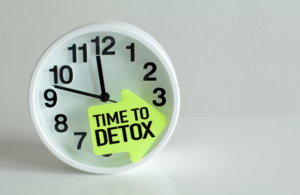With the complexities of substance use and addiction, understanding the importance of drug detoxification is vital for your journey towards recovery. This process not only helps your body remove harmful substances but also lays the groundwork for a healthier lifestyle. By learning about various detox programs on Transformations Care, exploring our admission process, and discovering the benefits of holistic therapies at Transformations Care, you empower yourself to take the necessary steps for lasting health and well-being.

Key Takeaways:
- Drug detoxification is a vital first step in the recovery journey, enabling individuals to rid their bodies of harmful substances safely. For more information on the process, visit our Detox Programs page.
- Medical supervision during detox can significantly reduce withdrawal symptoms and increase the chances of a successful transition into rehabilitation. Learn more about our Medical Detox Programs.
- The detoxification process not only addresses physical dependence but also prepares individuals for the therapeutic aspects of recovery, as detailed in our Recovery Programs section.
- Detoxification sets the foundation for emotional healing and mental health support, which are integral to long-term recovery success. Discover our approach to Mental Health Support.
- Following detox, ongoing support and therapy are necessary to help individuals maintain sobriety and prevent relapse. For post-detox resources, check out our Aftercare Programs.
Understanding Drug Detoxification
For anyone grappling with substance use disorder, understanding the process of drug detoxification is a vital first step in reclaiming your life. Detoxification is the medical process of allowing the body to rid itself of toxic substances, particularly drugs and alcohol. This can be necessary after prolonged use, where the body has adapted to the presence of these substances. The process often involves managing withdrawal symptoms and the physiological changes that occur as your body begins to function without the drugs. A well-structured detoxification program can set the groundwork for a successful recovery journey, guiding you towards lifelong wellness.
Definition of Drug Detoxification
Detoxification refers to the medical and therapeutic methods used to assist individuals in eliminating harmful substances from their system. This may include medications to alleviate withdrawal symptoms, counseling, and psychological support. The ultimate goal of detoxification is to stabilize your physical health while addressing the underlying psychological factors contributing to drug dependency. It is the first vital step in a comprehensive recovery program that may include further behavioral therapies and support mechanisms.
The Need for Detoxification
Below the surface of addiction lies a powerful physical and psychological dependency that often requires intervention. Detoxification serves as a critical initial step in helping you break free from the grip of addiction and recover your ability to lead a fulfilling life. This process not only helps you manage the uncomfortable withdrawal symptoms often associated with ceasing drug use but also prepares your body to regain its natural balance. Without detoxification, you may find it exceedingly difficult to move forward with other recovery strategies. It is within this relatively safe environment that you can start to heal and prepare for the challenges ahead.
It is crucial to recognize that not all detoxification programs are created equal. Each individual may experience different symptoms, and the duration and intensity of detox can vary greatly depending on the substances used and the duration of use. For example, you can explore more about our comprehensive detox programs at Transformations Care Detox Programs. Understanding your own needs and tailoring the detox process to suit them will enhance your chances of succeeding in your recovery. For additional insights on detox strategies and support, consider visiting our resource page on Transformations Care Resources and our informative blog posts concerning detoxification. Your road to recovery starts here.
The Process of Detoxification
Clearly, understanding the process of detoxification is vital for anyone considering drug recovery. It encompasses a range of methods and approaches that your body uses to eliminate substances that it has become dependent on. Detoxification is not merely about stopping drug use; it’s about allowing your body and mind to recover from the effects of substances, ultimately leading you towards a path of health and wellness. If you’re interested in learning more, you can explore the detoxification services offered at Transformations Care.
Types of Detoxification
The process of detoxification varies depending on the method used and the substances involved. Each type has its approach, duration, and techniques employed to facilitate your mental and physical recovery. Here are some common forms of detoxification:
- Medical Detox: Monitored by healthcare professionals to manage withdrawal symptoms safely.
- Outpatient Detox: Suitable for those with a strong support system and less severe dependencies.
- Inpatient Detox: Provides a controlled environment where you can focus solely on recovery.
- Social Detox: Relies on community support and engagement for emotional and psychological stability.
- Holistic Detox: Incorporates nutrition, physical activity, and mental wellness practices for a comprehensive approach.
Any of these detoxification methods can be tailored to meet your specific needs, making it crucial to consult with a professional to determine the best path forward.
| Type of Detox | Description |
| Medical Detox | Involves medical supervision to safely manage withdrawal. |
| Inpatient Detox | Residential program providing 24/7 support. |
| Outpatient Detox | Less intensive care, allowing for flexibility. |
| Holistic Detox | Focuses on total well-being through natural methods. |
The Detoxification Timeline
To effectively navigate the detoxification process, it’s useful to understand the expected timeline. The duration of detoxification can vary significantly based on the substances involved and the individual’s unique situation. Typically, you might experience acute withdrawal symptoms that begin within a few hours to several days after your last use. This phase can last from a few days to a couple of weeks, depending on the severity of the dependency.
It is crucial to note that the timeline can also differ based on the method of detox chosen. For example, a medically supervised detox may allow for closer monitoring and a more tailored approach to support your withdrawal experience. If you want to examine deeper into detox timelines, the frequently asked questions page on Transformations Care can provide you with valuable insights.
Detox can be a complex journey filled with challenges, but understanding this timeline helps prepare you for what to expect. Engaging with professionals throughout this process is highly beneficial, ensuring you receive the necessary support tailored to your needs.
Withdrawal Symptoms
For individuals undergoing drug detoxification, understanding withdrawal symptoms is important for navigating the process effectively. Withdrawal symptoms can manifest as both physical and psychological reactions, and recognizing these symptoms can help you prepare for the journey ahead. If you or a loved one are contemplating detox, it’s important to familiarize yourself with these signs and how to manage them while seeking support from professionals.
Physical Symptoms
To comprehend the physical symptoms associated with withdrawal, you should be aware that these symptoms can range from mild discomfort to severe illness. They may include nausea, vomiting, muscle aches, sweating, and headaches. You might also experience fatigue and changes in appetite. These physical symptoms occur due to your body’s reaction to the absence of a substance it has become accustomed to. Understanding these symptoms can help you be better equipped to address them.
To ease these physical symptoms, consider seeking help from a medical professional or detox facility. Programs such as those offered at Transformations Treatment Center provide a supportive environment equipped to manage and alleviate withdrawal symptoms effectively. This support can be critical in ensuring a safer and more comfortable detox experience.
Psychological Symptoms
About psychological symptoms, it’s important to note that they can be just as debilitating as physical ones. During withdrawal, you may experience anxiety, depression, irritability, and mood swings. These symptoms often arise as your brain struggles to regain its natural balance without the influence of substances. Being aware of these changes is vital, as it allows you to reach out for help when needed.
Due to the diverse range of psychological symptoms, you may find that the emotional impact of withdrawal can be overwhelming. It’s important to harness coping strategies or seek support from therapists and support groups. Facilities like Transformations Care Resources offer comprehensive programs that integrate both psychological support and therapeutic practices to ease your mind during this challenging phase.
Duration and Severity
Below, the duration and severity of withdrawal symptoms can vary significantly based on several factors, including the type of substance used, the length of use, and your overall health condition. You may find that some symptoms begin within hours of your last dose, while others can take days or even weeks to manifest. The intensity of these symptoms can also fluctuate, making it imperative to remain vigilant and connect with healthcare providers for a tailored approach to your detox.
The severity of withdrawal symptoms can also influence how long the detox process lasts. Some individuals may experience mild symptoms that transition quickly through the acute phase. On the other hand, severe withdrawal symptoms can prolong the duration of the detoxification process. To navigate this effectively and receive appropriate care, consider reaching out to professionals experienced in substance use treatment, like those at Transformations Care Contact Us, who can provide personalized support and guidance tailored to your unique situation.
Benefits of Drug Detoxification
Once again, initiateing on a journey of drug detoxification offers numerous benefits that can lead to a healthier and more fulfilling life. This process not only aids in purging harmful substances from your system but also sets the stage for significant improvements in both your physical and mental well-being. When you commit to detoxification, you are making a conscious decision to prioritize your health, paving the way for a brighter future.
Physical Health Improvements
To begin with, detoxification immensely contributes to your physical health. When you rid your body of drugs and toxins, you allow your organs to function more efficiently. Your liver, kidneys, and digestive system begin to repair themselves after being subjected to the damaging effects of substance abuse. As you progress through detox, you may notice improvements in your energy levels, allowing you to engage more actively in daily activities and exercise, which is vital for overall health. For further information on how to support your physical journey, check our articles on [nutrition during recovery](https://transformationscare.com/nutrition-during-recovery) and [exercising for wellness](https://transformationscare.com/exercising-for-wellness).
Moreover, detoxification can also have a positive impact on your immune system. A body free from the excess toxins associated with drugs is better equipped to fend off illnesses. You may experience fewer colds, infections, and other health-related issues that can plague your physical well-being. Understanding the connection between detoxification and physical health can help reinforce your commitment to this transformative process.
Mental Health Improvements
Behind every physical symptom lies an intricate web of mental health challenges often exacerbated by drug use. As you detoxify, you may notice that your mood stabilizes, anxiety levels decrease, and feelings of depression may subside. Improvements in mental clarity and emotional resilience can lead to a more positive outlook on life and increased motivation to pursue personal goals. For insights on managing mental health during detox, consider reading our resource on [mindfulness practices](https://transformationscare.com/mindfulness-practices).
Further, the mental health benefits of detox are supported by the concept of neuroplasticity, where your brain can form new neural connections. As you step away from the consumption of drugs, your brain undergoes a process of healing and recovery, enabling you to develop healthier coping mechanisms and thought patterns. Embracing this transformation allows you to better engage with your emotions and build stronger relationships, ultimately enhancing your quality of life.
Behavioral Changes
Health improvements throughout detoxification also encompass significant behavioral changes. These changes manifest as you adopt a healthier lifestyle and implement better coping strategies. You may find yourself engaging in activities that promote well-being, such as exercising, socializing with supportive friends or family, or pursuing new hobbies. These shifts not only signify growth but also establish a stronger foundation for long-term recovery.
In addition, as you work through the detox process, you are likely to cultivate stronger self-discipline and resilience. Learning to face triggers and cravings head-on rather than relying on drugs can empower you to take charge of your life. Engaging with support networks through resources like [group therapy sessions](https://transformationscare.com/group-therapy-sessions) can further reinforce these positive behavioral changes, setting you up for a sustainable recovery path.
Choosing a Detoxification Program
Your journey towards recovery begins with selecting the right detoxification program tailored to your unique needs. With a multitude of options available, it is vital to focus on what will work best for you. Detox programs can vary significantly in terms of methodology, duration, and support systems. To make an informed choice, take the time to explore the facilities, treatment protocols, and the expertise of the staff. You should look for programs that emphasize a holistic approach, addressing both the physical and psychological aspects of addiction. Transformations Care offers various detox options that integrate medical support and therapeutic practices, ensuring you receive optimal care.
Factors to Consider
Factors to consider when choosing a detoxification program can heavily influence your success and comfort level during the detox process. First and foremost, evaluate the level of care provided—whether it be inpatient or outpatient, and if it includes medical supervision. This can be particularly important if you are dealing with severe withdrawal symptoms that warrant close monitoring. Additionally, consider the program’s length, structure, and method of therapy.
- Type of substances being detoxed from
- Availability of personalized treatment plans
- Experience and qualifications of the staff
- Support services like counseling and peer support
- Follow-up care and aftercare options
Knowing these factors can significantly impact the effectiveness of your detoxification experience.
Success Rates of Different Programs
Treatment success rates can greatly vary among different detox programs based on several elements, including the method of detoxification used and the level of support offered. Some programs may boast higher success rates due to their comprehensive approach, which includes addressing co-occurring mental health issues alongside substance abuse. It’s vital to research and compare the success rates of different programs to find the one that aligns most closely with your recovery goals.
Hence, an informed decision on the detox program can ultimately lead to a more sustainable recovery journey. For further information, explore our resources on [personalized treatment plans](https://transformationscare.com/personalized-treatment/), [medically assisted detox](https://transformationscare.com/medically-assisted-detox/), and [aftercare support](https://transformationscare.com/aftercare/), which thoroughly explain the various options available to help you in your recovery process.
Continuing Recovery Post-Detox
Unlike some misconceptions, detoxification is just the beginning of your recovery journey. While it plays a significant role in getting the substances out of your system, the real challenge lies ahead. Your journey continues with focusing on your mental and emotional health, and it’s necessary to engage in appropriate aftercare programs to ensure lasting success. According to Detoxification and Substance Abuse Treatment, incorporating a structured aftercare plan is vital for maintaining sobriety and preventing relapse.
Importance of Aftercare
Along with detoxification, aftercare is a vital component that assists you in transitioning back into daily life. This phase focuses on understanding the triggers that lead to substance use and developing coping strategies to manage stress and emotions safely. Engaging in aftercare not only reinforces the skills learned during detox but also provides a supportive community that encourages continued growth and healing.
Without aftercare, the risk of relapse increases significantly. Many individuals experience intense cravings even after completing detox. By participating in aftercare, you can receive ongoing support through counseling, group therapy, or fellowships designed to keep you connected and accountable.
Types of Aftercare Options
Among the various options available for aftercare, you may discover differences in approaches that cater to individual needs. Some popular formats include outpatient treatment programs, sober living houses, and support groups like Alcoholics Anonymous (AA) or Narcotics Anonymous (NA). You could explore therapy options ranging from cognitive-behavioral therapy to holistic approaches, allowing you to customize your path to recovery.
| Outpatient Treatment | Provides therapy while you maintain your daily responsibilities. |
| Sober Living Homes | A drug-free living environment supporting your recovery efforts. |
| Support Groups | Fosters shared experiences and accountability among peers. |
| Therapy | Guided sessions to explore personal triggers and coping mechanisms. |
| Relapse Prevention Programs | Equips you with strategies to maintain sobriety amidst challenges. |
In fact, exploring various aftercare options can lead to a more personalized recovery experience, enhancing the likelihood of sustained success. By assessing what fits your lifestyle and needs, you can create a holistic plan that aligns with your goals. Each step you take in aftercare equips you with tools vital for long-term sobriety.
- Outpatient counseling sessions to address ongoing issues.
- Coping skills workshops to help avoid triggers.
- Sober groups to find solidarity with others on similar paths.
- Yoga and meditation classes to improve mental health.
- Relapse prevention planning with guidance from professionals.
About support systems and resources, they play an vital role as you navigate life after detox. Building a strong network of family, friends, and fellow recovery individuals can significantly bolster your resilience against relapse. Emotional support is vital, and participating in group therapy or alumni programs can strengthen those connections while providing accountability and encouraging your growth.
Aftercare is much more than just seeking treatment; it is about building your life in a supportive environment. Engaging with services like those offered at Transformations Care can provide you with resources to sustain your recovery journey, ensuring you remain connected to a community that shares your commitment to health and sobriety. By reaching out to these available resources, you empower yourself and take control over your recovery journey.
Conclusion
Following this, it’s vital for you to understand the significance of drug detoxification as a foundational step in your journey to recovery. Engaging in a comprehensive detox program allows your body to safely eliminate harmful substances while providing you with the necessary tools to combat addiction. You can explore various detox options at Transformations Care, such as our detox programs tailored to meet your unique needs. With the right support and resources, you can regain control of your life and establish a healthier, sober future.
Your commitment to detoxification is not just about physical health; it also paves the way for emotional and psychological well-being. By participating in our mental health services, you enhance your chances of long-term recovery. The more you educate yourself about the detox process, the better equipped you will be to make informed decisions. Discover transformative success stories and further information on living sober, and take the first steps toward a fulfilling future without addiction.
FAQ
Q: What is drug detoxification and why is it important?
A: Drug detoxification is the process of removing toxic substances from the body, typically after someone has developed a dependence on drugs or alcohol. It is necessary because it helps to manage withdrawal symptoms, reduces the risk of relapse, and prepares individuals for further treatment. A successful detox lays the foundation for long-term recovery, allowing individuals to participate in programs like residential treatment which address the underlying reasons for substance use.
Q: How long does the detox process take?
A: The duration of the detox process can vary based on several factors including the substance involved, duration of use, and individual health conditions. Generally, detox can take anywhere from a few days to several weeks. After detoxification, individuals can benefit from continued support through programs like outpatient treatment which provide ongoing care while adapting to life without substances.
Q: Are there any risks associated with drug detoxification?
A: Yes, drug detoxification can pose various risks, particularly if not done under medical supervision. Withdrawal symptoms can be severe and potentially life-threatening, especially with substances like alcohol and opioids. It is vital to undergo detox in a professional setting, such as Transformations Care’s detox program, to ensure safety and receive appropriate medical support throughout the process.
Q: What can I expect during the detox process?
A: During detox, individuals may experience physical and psychological withdrawal symptoms as their body adjusts to the absence of the substance. This can include anxiety, cravings, nausea, and fatigue. A comprehensive detox program will provide medical oversight, therapeutic support, and resources to help manage these symptoms effectively. Following detox, integrating into treatment options such as holistic therapy can further enhance recovery outcomes.
Q: How does detoxification fit into the overall recovery process?
A: Detoxification is the first step in the recovery journey, acting as a bridge to more intensive therapy and rehabilitation programs. After detox, individuals are better prepared to engage in therapeutic modalities, such as individual therapy, which can help address psychological and emotional challenges linked to substance use. This comprehensive approach boosts the likelihood of sustained recovery and long-term well-being.




















